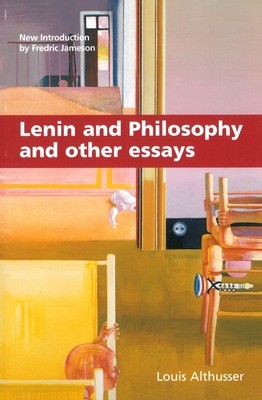
- Išsiųsime per 10–14 d.d.
- Autorius: Louis Althusser
- Leidėjas: Monthly Review Press
- ISBN-10: 1583670394
- ISBN-13: 9781583670392
- Formatas: 15.2 x 22.7 x 1.3 cm, minkšti viršeliai
- Kalba: Anglų
- Extra -15 % nuolaida šiai knygai su kodu: ENG15
Atsiliepimai
Aprašymas
No figure among the western Marxist theoreticians has loomed larger in the postwar period than Louis Althusser. A rebel against the Catholic tradition in which he was raised, Althusser studied philosophy and later joined both the faculty of the Ecole normal superieure and the French Communist Party in 1948. Viewed as a structuralist Marxist, Althusser was as much admired for his independence of intellect as he was for his rigorous defense of Marx. The latter was best illustrated in For Marx (1965), and Reading Capital (1968). These works, along with Lenin and Philosophy (1971) had an enormous influence on the New Left of the 1960s and continues to influence modern Marxist scholarship.
This classic work, which to date has sold more than 30,000 copies, covers the range of Louis Althusser's interests and contributions in philosophy, economics, psychology, aesthetics, and political science.
Marx, in Althusser's view, was subject in his earlier writings to the ruling ideology of his day. Thus for Althusser, the interpretation of Marx involves a repudiation of all efforts to draw from Marx's early writings a view of Marx as a humanist and historicist.
Lenin and Philosophy also contains Althusser's essay on Lenin's study of Hegel; a major essay on the state, Ideology and Ideological State Apparatuses, Freud and Lacan: A letter on Art in Reply to André Daspre, and Cremonini, Painter of the Abstract. The book opens with a 1968 interview in which Althusser discusses his personal, political, and intellectual history.
EXTRA 15 % nuolaida su kodu: ENG15
Akcija baigiasi už 2d.19:40:39
Nuolaidos kodas galioja perkant nuo 10 €. Nuolaidos nesumuojamos.

- Autorius: Louis Althusser
- Leidėjas: Monthly Review Press
- ISBN-10: 1583670394
- ISBN-13: 9781583670392
- Formatas: 15.2 x 22.7 x 1.3 cm, minkšti viršeliai
- Kalba: Anglų
No figure among the western Marxist theoreticians has loomed larger in the postwar period than Louis Althusser. A rebel against the Catholic tradition in which he was raised, Althusser studied philosophy and later joined both the faculty of the Ecole normal superieure and the French Communist Party in 1948. Viewed as a structuralist Marxist, Althusser was as much admired for his independence of intellect as he was for his rigorous defense of Marx. The latter was best illustrated in For Marx (1965), and Reading Capital (1968). These works, along with Lenin and Philosophy (1971) had an enormous influence on the New Left of the 1960s and continues to influence modern Marxist scholarship.
This classic work, which to date has sold more than 30,000 copies, covers the range of Louis Althusser's interests and contributions in philosophy, economics, psychology, aesthetics, and political science.
Marx, in Althusser's view, was subject in his earlier writings to the ruling ideology of his day. Thus for Althusser, the interpretation of Marx involves a repudiation of all efforts to draw from Marx's early writings a view of Marx as a humanist and historicist.
Lenin and Philosophy also contains Althusser's essay on Lenin's study of Hegel; a major essay on the state, Ideology and Ideological State Apparatuses, Freud and Lacan: A letter on Art in Reply to André Daspre, and Cremonini, Painter of the Abstract. The book opens with a 1968 interview in which Althusser discusses his personal, political, and intellectual history.




Atsiliepimai